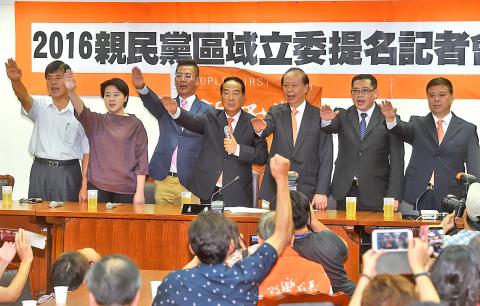People First Party (PFP) Chairman James Soong (宋楚瑜) yesterday said he would consider running for president if he thinks the two major parties’ policies have been “hijacked by fundamentalists.”
The PFP held a press conference in Taipei to announce its five legislative candidates for the Jan. 16 elections. Three of the candidates are former Chinese Nationalist Party (KMT) legislators, including Chang Sho-wen (張碩文), who just withdrew from the KMT earlier this week.
Soong likened the KMT to an apothecary that “sells counterfeit medicine.”

Photo: Chien Jung-fong, Taipei Times
“It is not that the PFP has turned ‘green,’” Soong said, addressing criticism that the party has aligned itself with the Democratic Progressive Party (DPP). “It is that we can no longer say for sure whether the KMT is lan [藍, blue] or just lan [爛, rotten].”
The PFP has always been Sun Yat-sen’s (孫逸仙) disciple and a resolute follower of former president Chiang Ching-kuo’s (蔣經國) path in safeguarding the Constitution of the Republic of China and Taiwanese democracy, as well as pushing for cross-strait reconciliation, Soong said.
“The PFP is willing to stand by good KMT candidates, but if the KMT cannot break away from [President Ma Ying-jeou’s (馬英九) inner circle], we have no other choice but to field our own,” the chairman said.
When asked whether he would run for president, Soong said he would consider the possibility if the public calls for it, but added that it was not yet time to make a decision and he would continue to keep an eye on the KMT’s and the DPP’s policies.
Separately yesterday, KMT Legislator Cheng Ru-fen (鄭汝芬) of Changhua County said she would turn down the party’s legislative nomination. She is the seventh KMT lawmaker who has decided not to run for another term.
Cheng’s announcement came hours after KMT Legislator Chang Chia-chun (張嘉郡) voiced her misgivings about KMT presumptive presidential nominee Hung Hsiu-chu’s (洪秀柱) cross-strait proposal of “one China, common interpretation” and threatened to withdraw from the party.
“Public opinion has changed after the nine-in-one elections in November last year. The KMT would be going against the tide of public opinion if it does not undertake reforms,” Cheng said.
Hung, when asked about the show of disapproval from several KMT lawmakers, said she would work on improving communication with lawmakers.
Hung’s spokesperson, Jack Yu (游梓翔), said that the deputy legislative speaker’s team has been communicating with party comrades about her cross-strait policy.
He said that after talking to some party members, they “have grasped the content of the policy and believe that Hung’s cross-strait policy reflects Taiwanese mainstream opinion.”
The policy is a demand that “Beijing respect the existence of the Republic of China as a fact, based on the ‘1992 consensus,’” Yu said.

Chinese Nationalist Party (KMT) Chairman Eric Chu (朱立倫), spokeswoman Yang Chih-yu (楊智伃) and Legislator Hsieh Lung-chieh (謝龍介) would be summoned by police for questioning for leading an illegal assembly on Thursday evening last week, Minister of the Interior Liu Shyh-fang (劉世芳) said today. The three KMT officials led an assembly outside the Taipei City Prosecutors’ Office, a restricted area where public assembly is not allowed, protesting the questioning of several KMT staff and searches of KMT headquarters and offices in a recall petition forgery case. Chu, Yang and Hsieh are all suspected of contravening the Assembly and Parade Act (集會遊行法) by holding

PRAISE: Japanese visitor Takashi Kubota said the Taiwanese temple architecture images showcased in the AI Art Gallery were the most impressive displays he saw Taiwan does not have an official pavilion at the World Expo in Osaka, Japan, because of its diplomatic predicament, but the government-backed Tech World pavilion is drawing interest with its unique recreations of works by Taiwanese artists. The pavilion features an artificial intelligence (AI)-based art gallery showcasing works of famous Taiwanese artists from the Japanese colonial period using innovative technologies. Among its main simulated displays are Eastern gouache paintings by Chen Chin (陳進), Lin Yu-shan (林玉山) and Kuo Hsueh-hu (郭雪湖), who were the three young Taiwanese painters selected for the East Asian Painting exhibition in 1927. Gouache is a water-based

Taiwan would welcome the return of Honduras as a diplomatic ally if its next president decides to make such a move, Minister of Foreign Affairs Lin Chia-lung (林佳龍) said yesterday. “Of course, we would welcome Honduras if they want to restore diplomatic ties with Taiwan after their elections,” Lin said at a meeting of the legislature’s Foreign Affairs and National Defense Committee, when asked to comment on statements made by two of the three Honduran presidential candidates during the presidential campaign in the Central American country. Taiwan is paying close attention to the region as a whole in the wake of a

OFF-TARGET: More than 30,000 participants were expected to take part in the Games next month, but only 6,550 foreign and 19,400 Taiwanese athletes have registered Taipei city councilors yesterday blasted the organizers of next month’s World Masters Games over sudden timetable and venue changes, which they said have caused thousands of participants to back out of the international sporting event, among other organizational issues. They also cited visa delays and political interference by China as reasons many foreign athletes are requesting refunds for the event, to be held from May 17 to 30. Jointly organized by the Taipei and New Taipei City governments, the games have been rocked by numerous controversies since preparations began in 2020. Taipei City Councilor Lin Yen-feng (林延鳳) said yesterday that new measures by